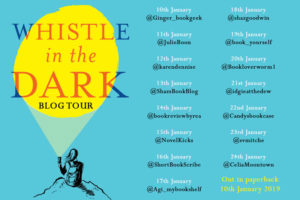
ShortBookandScribes #BookReview + #Extract from Whistle in the Dark by Emma Healey @ECHealey @PenguinUKBooks #BlogTour
I loved Emma Healey’s first book, Elizabeth is Missing, so I was very keen to read this, her second book. And what an absolute treat it was too. My thanks to Georgia Taylor from Penguin for the place on the tour and the review copy of the book.
![]()
How do you rescue someone who has already been found?
Jen’s fifteen-year-old daughter goes missing for four agonizing days. When Lana is found, unharmed, in the middle of the desolate countryside, everyone thinks the worst is over. But Lana refuses to tell anyone what happened, and the police think the case is closed. The once-happy, loving family returns to London, where things start to fall apart. Lana begins acting strangely: refusing to go to school, and sleeping with the light on.
With her daughter increasingly becoming a stranger, Jen is sure the answer lies in those four missing days. But will Lana ever reveal what happened?
Or support your high street with Hive.
![]()
Whistle in the Dark is the study of the relationship between a mother and a daughter, Jen and Lana. The book begins when Lana has just been found after being missing for four days. She’s 15 but a grown up 15, struggling with depression. Jen is, understandably, incredibly pleased that Lana is safe but it leads Jen to question everything, especially as Lana won’t say where she has been.
Jen is anxious, paranoid, het up and she becomes obsessed with knowing what happened. Lana, on the other hand, is determined that what happened is over and done with and she doesn’t want to dwell on it.
I loved Emma Healey’s debut, Elizabeth is Missing, but I don’t remember coming to the end of it and feeling quite like I do now. Whistle in the Dark is an extraordinary novel, both beautifully written and incredibly insightful. I thought Healey’s portrayal of what it’s like to be the mother, the daughter and the other daughter, the one that feels like she’s in the shadow of the one that gets all the attention, was superb. What’s clever too is that she made me see it from all angles and what was clear was that nobody was right or wrong, it’s just about learning to understand others’ feelings whilst also preserving your own.
This is a family drama, a story of tension within families, of trying to do your best and still feeling like you’re failing. I felt so sorry for Jen, suffocating Lana with her intensity and her inability to let anything go, especially given that Lana knows Jen’s weaknesses and plays on them. In fact, I did consider the fact that Lana was almost bullying Jen. But then, I considered Lana’s state of mind, her difficulty, her teenage-ness and it was clear that she was coping in the only way she could. I should just mention Hugh here, Jen’s husband, Lana’s father. He and Meg, Lana’s much older sister (by 11 years) are the steadying influences, the rocks, the foundations of the family. As a whole, the family are absolutely fascinating. There are a few other characters but it is this foursome around which the whole story revolves.
Whilst not a comedy by any means, this is a book that has dry wit written through it like a stick of Blackpool rock. It had me guffawing many times or smiling wryly to myself. Healey is a very talented writer, one that made me feel all the emotions. Whistle in the Dark is full of depth and beautifully written. I loved it.
![]()
‘This has been the worst week of my life,’ Jen said. Not what she had planned to say to her fifteen-year-old daughter after an ordeal that had actually covered four days.
‘Hi, Mum.’ Lana’s voice emerged from blue-tinged lips.
Jen could only snatch a hug, a press of her cheek against Lana’s ‒ soft and pale as a mushroom ‒ while the paramedics slammed the ambulance doors and wheeled Lana into the hospital. There was a gash on the ashen head, a scrape on the tender jaw, she was thin and cold and wrapped in tin foil, she smelled soggy and earthy and unclean, but it was okay: she was here, she was safe, she was alive. Nothing else mattered.
Cigarette smoke drifted over from the collection of dressing-gowned, IV‑attached witnesses huddled under the covered entrance, and a man’s voice came with it.
‘What’s going off? Is that the lass from London?’
‘Turned up, then,’ another voice answered. ‘Heard it said on the news.’
So the press had been told already. Jen supposed that was a good thing: they could cancel the search, stop asking the public to keep their eyes open, to report possible sightings, to contact the police if they had information. It was a happy ending to the story. Not the ending anyone had been expecting.
The call had come less than an hour ago, Hugh, wrapped in a hotel towel, just out of the shower (because it was important to keep going), Jen not dressed and unshowered (because she wasn’t convinced by Hugh’s argument). They had never given up hope, that’s what she would say in the weeks to come, talking to friends and relatives, but really her hope, that flimsy Meccano construction, had shaken its bolts loose and collapsed within minutes of finding Lana missing.
Even driving to the hospital, Jen had been full of doubt, assuming there’d been a mistake, imagining a different girl would meet them there, or a lifeless body. The liaison officer had tried to calm her with details: a farmer had spotted a teenager on sheep-grazing land, he’d identified her from the news and called the police, she was wearing the clothes Jen had guessed she’d be wearing, she’d been well enough to drink a cup of hot, sweet tea, well enough to speak, and had definitely answered to the name Lana.
And then there she was, recognizable and yet unfamiliar, a sketch of herself, being coloured in by the hospital: the black wheelchair rolling to the reception desk, the edges of Lana’s red blanket billowing, a nurse in blue sweeping by with a white-coated doctor and the green-uniformed paramedics turning to go out again with a wave. Jen felt too round, the lines of her body too thick and slow for the pace, and she hung back a moment, feeling Hugh’s hands on her shoulders.
He nudged her forward. Lana’s wheelchair was on the move and Jen felt woozy, the scent of disinfectant whistling through her as they got deeper into the hospital. She hadn’t anticipated this, hadn’t been rehearsing for doctors and a recovery, had pictured only police press conferences and a funeral, or an endless, agonizing wait. The relief was wonderful, the relief was ecstasy, the relief made her ticklish, it throbbed in her veins. The relief was exhausting.
‘How are you feeling?’ she asked Hugh, hoping his answer would show her how to react, how to behave.
‘I don’t know,’ Hugh said. ‘I don’t know yet.’
They spent several hours in A&E while Lana had skeletal surveys and urine tests and her head was cleaned and stitched and some of her hair was cut. Her clothes were exchanged for a gown, and her feet, pale and chalky, stuck out naked from the hem. Jen wanted to hold those feet to her chest, to kiss them, as she had when Lana was a baby, but just above each ankle was a purplish line, like the indentations left by socks, only thinner, darker. The kind of mark a fine rope might leave. They made Jen pause, they were a hint, a threat, and they signalled a beginning ‒ the beginning of a new doubt, a new fear, a new gap opening up between her and her daughter.
The police noticed the marks, too, and photographed them when they came to take Lana’s white fleece jacket, now brown and stiff with blood. There was so much blood on it that Jen found herself wondering again if her daughter was really still alive.
![]()

![]()
 Emma Healey wrote her first short story when she was four, told her teachers she was going to be a writer when she was eight, but had learnt better by twelve and had decided on being a litigator (inspired entirely by the film Clueless). It took another ten years before she came back to writing. She grew up in London where she went to art college and completed her first degree in bookbinding. She then worked for two libraries, two bookshops, two art galleries and two universities, and was busily pursuing a career in the art world before writing overtook everything. She moved to Norwich in 2010 to study for the MA in Creative Writing at UEA and never moved back again.
Emma Healey wrote her first short story when she was four, told her teachers she was going to be a writer when she was eight, but had learnt better by twelve and had decided on being a litigator (inspired entirely by the film Clueless). It took another ten years before she came back to writing. She grew up in London where she went to art college and completed her first degree in bookbinding. She then worked for two libraries, two bookshops, two art galleries and two universities, and was busily pursuing a career in the art world before writing overtook everything. She moved to Norwich in 2010 to study for the MA in Creative Writing at UEA and never moved back again.
Author bio and photo taken from Amazon
